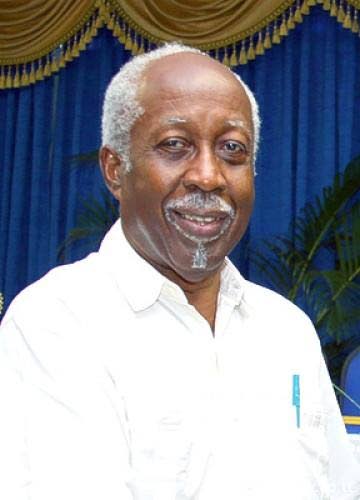Knight stars

Reginald Dumas
I HAVE JUST finished reading Son of Grace, a biography of the late Sir Frank Worrell by Vaneisa Baksh. Michael Holding, quoted on the book cover, finds the work “absolutely brilliant.” I agree.
When you speak about cricket books, you think instinctively of CLR James’s Beyond a Boundary, surely the finest book ever written on cricket and society, particularly West Indian society. But James was a pioneering philosopher, breaking new ground by boldly and lucidly using the game of cricket, and players of that game, as a lever to prise open the door to a better understanding of ourselves, of what we were, of our potential and possibilities.
Ms Baksh is not so ambitious, though she too is aware of the societal implications of cricket. Her book focuses on Worrell the person – as student in Barbados, as husband and father, as university warden, as mentor, as regionalist, as leader on and off the field. It is a fascinating story, from which I learned much.
I am old enough to have seen Worrell bat at the Queen’s Park Oval, and to have seen the Three Ws, as they came to be known everywhere – Worrell, Everton Weekes and Clyde Walcott, all to receive knighthoods – in action for Barbados against Trinidad (“Trinidad and Tobago” was never used) or for the West Indies against visiting teams.
Worrell was the most elegant of batsmen. In his death tribute to him – Worrell was only 42 when he left us – Neville Cardus (another outstanding cricket writer) called him “the most completely stylish of all West Indies batsmen…I never saw him make a crude or ungrammatical stroke…”
Cardus also said, and my childhood recollection of more than seven decades ago supports him, that Worrell didn’t have “the dynamic, spectacular energy of Weekes or Walcott; he was never, to my knowledge, demonstrative or spectacularly aggressive…” One shot of his – I must have been 11 or 12 at the time – I still see clearly.
It was Barbados against Trinidad. Worrell had just come to the wicket; Prior Jones, one of Trinidad’s opening bowlers, was operating from the Oval’s northern end. Jones sent down a bouncer which hit Worrell on the shoulder. The crowd erupted in rage. Imagine: Trinidadians booing a Trinidad bowler for hitting a Barbados batsman! Clearly rattled, Jones overpitched his next ball, and Worrell, cool and easy as you please, persuaded it silkily to the cover boundary. The crowd erupted again: Worrell was their boy.
And the “dynamic, spectacular energy” of Walcott and Weekes? My memory of a Walcott shot involves the luckless Prior Jones again. Perhaps tired, he had dropped the ball short; it didn’t rise. Walcott, a big man, pounced on it. The ball rocketed off his bat and crashed into a public stand backward of square leg; it never got up more than four feet or so from the ground. It remains the hardest-hit, flattest six I’ve ever seen.
Weekes wasn’t a hitter of sixes. Short and compact, with powerful forearms and wrists, he preferred to move the ball along the ground. But one of his shots, an aerial improvisation, still amazes me. It was the West Indies against India, which had a first-rate opening bowler in Dattu Phadkar (he and Worrell, Ms Baksh tells us, later became great friends).
Phadkar was fast-medium, accurate, and swung the ball both ways; even the in-form Weekes couldn’t get him away. But then he sent down a short ball which lifted sharply; it was set to pass over Weekes’s head. Weekes instantly reared back, and hit what I can best describe as the batting equivalent of an overhead tennis smash. I had never seen anything like it before; I haven’t seen anything like it since. And it added four runs to Weekes’s score.
But think how accurate Phadkar was. That afternoon, if I remember well, he bowled 17 overs for 16 runs (including Weekes’s boundary). Against the mighty West Indies playing at home!
Vaneisa Baksh was not yet born when all this was happening; I suspect her parents weren’t yet born either. But her book is a testament to diligent research, to care in checking and cross-checking, to balance in her portrait of the many-faceted Worrell.
She sums him up in her final words: “Worrell was a complex individual, barely understood in all his manifestations, but ultimately he shone as an exemplary figure: a man of generosity and grace. It is tempting to speculate about the role Worrell would have played in West Indian development and cricket had his life continued. It can only remain in the realm of wistfulness – that shadowy place of dreams unmade.”
You must get the book. And read it.

Comments
"Knight stars"